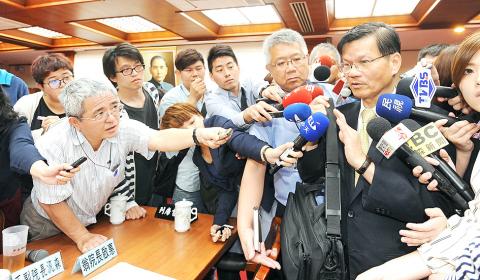A Legislative Yuan committee yesterday passed a motion asking Academia Sinica President Wong Chi-huey (翁啟惠) to resign amid a snowballing insider-trading scandal, while Wong said he might have indirectly invested in OBI Pharma Inc (台灣浩鼎), the company at the heart of the scandal.
Legislators across party lines passed the motion at a meeting of the Education and Culture Committee, which Wong attended.
The lawmakers said the scandal has done irreparable harm to Academia Sinica and the nation’s biotechnology industry, and Wong is no longer suitable to head the institute because he has failed to clarify his actions and is suspected of corruption and breach of trust.

Photo: Liu Hsin-de, Taipei Times
Wong should resign and cooperate with a prosecutors’ investigation, the motion states.
Wong tendered his resignation to President Ma Ying-jeou (馬英九) last month, citing health reasons, but Ma rejected it. He later decided to stay on in the post despite repeated calls for him to step down. On Tuesday, Ma denied Wong’s request for a 28-day leave of absence.
The controversy began after Wong endorsed OBI Pharma’s new cancer drugs, despite discouraging clinical trial results in February, and it emerged shortly afterward that his daughter is a major shareholder in the company. It also emerged that Wong, on behalf of his daughter, sold 10,000 of the firm’s shares before the trial results were publicly released.
Responding to Democratic Progressive Party Legislator Rosalia Wu’s (吳思瑤) question as to why he chose to stay in its post, thereby angering the public, Wong said: “I think the accusation is unfair to me. My resignation would not prove my innocence. I have to uphold Academia Sinica’s reputation, not mine. Many reports are unfair to me, so I have to remain in the post.”
Asked by Chinese Nationalist Party (KMT) Legislator Apollo Chen (陳學聖) if he held shares in OBI Pharma under other people’s names, Wong said he and OBI Pharma chairman Michael Chang (張念慈) had a joint investment fund, which was used to invest in two companies that later bought OBI Pharma shares.
“I gave the money to Chang, and he was in charge of the investment. I knew the two companies he invested in, which are not OBI Pharma. However, I realized later that the two companies had invested in OBI Pharma during the [prosecutors’] investigation,” he said.
While acknowledging Wong’s honesty, Chen said prosecutors should decide whether that investment violated the law.

The CIA has a message for Chinese government officials worried about their place in Chinese President Xi Jinping’s (習近平) government: Come work with us. The agency released two Mandarin-language videos on social media on Thursday inviting disgruntled officials to contact the CIA. The recruitment videos posted on YouTube and X racked up more than 5 million views combined in their first day. The outreach comes as CIA Director John Ratcliffe has vowed to boost the agency’s use of intelligence from human sources and its focus on China, which has recently targeted US officials with its own espionage operations. The videos are “aimed at

STEADFAST FRIEND: The bills encourage increased Taiwan-US engagement and address China’s distortion of UN Resolution 2758 to isolate Taiwan internationally The Presidential Office yesterday thanked the US House of Representatives for unanimously passing two Taiwan-related bills highlighting its solid support for Taiwan’s democracy and global participation, and for deepening bilateral relations. One of the bills, the Taiwan Assurance Implementation Act, requires the US Department of State to periodically review its guidelines for engagement with Taiwan, and report to the US Congress on the guidelines and plans to lift self-imposed limitations on US-Taiwan engagement. The other bill is the Taiwan International Solidarity Act, which clarifies that UN Resolution 2758 does not address the issue of the representation of Taiwan or its people in

SHIFT: Taiwan’s better-than-expected first-quarter GDP and signs of weakness in the US have driven global capital back to emerging markets, the central bank head said The central bank yesterday blamed market speculation for the steep rise in the local currency, and urged exporters and financial institutions to stay calm and stop panic sell-offs to avoid hurting their own profitability. The nation’s top monetary policymaker said that it would step in, if necessary, to maintain order and stability in the foreign exchange market. The remarks came as the NT dollar yesterday closed up NT$0.919 to NT$30.145 against the US dollar in Taipei trading, after rising as high as NT$29.59 in intraday trading. The local currency has surged 5.85 percent against the greenback over the past two sessions, central

US Indo-Pacific Commander Admiral Samuel Paparo on Friday expressed concern over the rate at which China is diversifying its military exercises, the Financial Times (FT) reported on Saturday. “The rates of change on the depth and breadth of their exercises is the one non-linear effect that I’ve seen in the last year that wakes me up at night or keeps me up at night,” Paparo was quoted by FT as saying while attending the annual Sedona Forum at the McCain Institute in Arizona. Paparo also expressed concern over the speed with which China was expanding its military. While the US